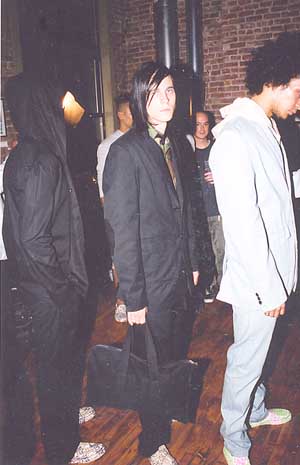|

ABOVE: Backstage
at Yoko Devereaux, spring 2004. INSET:
Thomas Meus, the founding design director of Yoko Devereaux.
Mr Salzer proved to
be excitable, serious, an astute thinker, plain-speaking philosopher,
and quite dedicated to his craft
|
 HE
AMERICAN menswear market is in flux. This is not just
an opinion I plucked out of the air to provoke controversy. This
is the belief of many people in the creative, financial and
retail sectors of the menswear fashion industry. At Bryant Park,
we once had a full-fledged fashion week for menswear designers;
now they have been relegated to a not much more than one-and-a-half
days’ worth of dedicated menswear shows. Some seasons, you’re lucky
if there are more than ten menswear designers showing at
the tents. The main focus has been shifted to Milano where everyone—European,
American, and Asian designers—débuts their seasonal offerings;
and even then, it’s still only three days of shows. You hear it
in the voices of buyers and analysts who follow the market. Much
like the dodo, the industry has lost a whole generation of male
customers who have abandoned the traditional mainstream purveyors
of male style, who aren’t coming back anytime soon. HE
AMERICAN menswear market is in flux. This is not just
an opinion I plucked out of the air to provoke controversy. This
is the belief of many people in the creative, financial and
retail sectors of the menswear fashion industry. At Bryant Park,
we once had a full-fledged fashion week for menswear designers;
now they have been relegated to a not much more than one-and-a-half
days’ worth of dedicated menswear shows. Some seasons, you’re lucky
if there are more than ten menswear designers showing at
the tents. The main focus has been shifted to Milano where everyone—European,
American, and Asian designers—débuts their seasonal offerings;
and even then, it’s still only three days of shows. You hear it
in the voices of buyers and analysts who follow the market. Much
like the dodo, the industry has lost a whole generation of male
customers who have abandoned the traditional mainstream purveyors
of male style, who aren’t coming back anytime soon.
Yoko Devereaux, a very successful conceptual menswear
start-up line based in Brooklyn, New York, is one of the emerging
bright spots on the New York’s menswear scene—and justifiably
so. Co-founded by long-time friends, Andrew Salzer and Thomas Meus,
the line is inspired by both classic menswear history and the emerging,
ever-changing voice of the youthful independent street culture in
New York City. Mr Salzer’s mission is to create clothes that speaks
to ‘a fashion aware customer (20–35) that believe[s] in [himself];
the man that lives an interesting and creative life.’ The brand,
even in its infancy, has done that and so much more. With its extension
into street~skateboard culture, the line also touches on the independent
music and artistic communities while keeping an open dialogue with
the more mainstream male customer looking to jazz up his wardrobe.
I met with Mr Salzer on a cold Saturday outside
the Metropolitan Museum of Art in early November, where we first
viewed the Men in Skirts
exhibit and later sat down to talk about life, work, change,
and why the menswear industry is down in the dumps and still has
further yet to go before regaining its previous financial
strength. By turns, Mr Salzer proved to be excitable, serious, an
astute thinker, plain-speaking philosopher, and quite dedicated
to his craft.
Lucire: Give us a brief history of Yoko Devereaux.
Andy Salzer: Yoko Devereaux started about three years ago.
Basically, I started the line with a good friend of mine, Thomas
Meus (below right), who became the founding design director.
What we wanted to  do
and what we tried to do was to look at the way fashion media has
affected a lot of the other aspects of fashion and kind of created
a face for the line that isn’t really there. Media [are] an illusion
and a lot of people in the industry get caught up in the [media-driven]
illusion so much to the point that they really don’t focus on the
design of the clothing. When we started doing this project three
years ago, there were a lot of independent designers just popping
up all over the place. A lot of that was a reaction to what was
going on in the industry where most of the [well known and firmly
established] fashion houses were starting to look alike; a lot of
the nuances of the older designers were getting removed from their
collections for the sake of making money and mainstreaming the process,
selling more products, creating diffusion lines. [While] it always
has been an image-conscious industry, it has become so much more
image-conscious that we wanted to actually allow ourselves to focus
more on the clothes and not call it the ‘Andy Salzer line’ or the
‘Thomas Meus line’. Our thinking was, ‘Let’s create the ultimate
fashion victim. Let’s create this “Yoko Devereaux” character
and let her be the face of the company so we can just focus on the
design.’ And that is how it all got started. do
and what we tried to do was to look at the way fashion media has
affected a lot of the other aspects of fashion and kind of created
a face for the line that isn’t really there. Media [are] an illusion
and a lot of people in the industry get caught up in the [media-driven]
illusion so much to the point that they really don’t focus on the
design of the clothing. When we started doing this project three
years ago, there were a lot of independent designers just popping
up all over the place. A lot of that was a reaction to what was
going on in the industry where most of the [well known and firmly
established] fashion houses were starting to look alike; a lot of
the nuances of the older designers were getting removed from their
collections for the sake of making money and mainstreaming the process,
selling more products, creating diffusion lines. [While] it always
has been an image-conscious industry, it has become so much more
image-conscious that we wanted to actually allow ourselves to focus
more on the clothes and not call it the ‘Andy Salzer line’ or the
‘Thomas Meus line’. Our thinking was, ‘Let’s create the ultimate
fashion victim. Let’s create this “Yoko Devereaux” character
and let her be the face of the company so we can just focus on the
design.’ And that is how it all got started.
CONTINUED

|